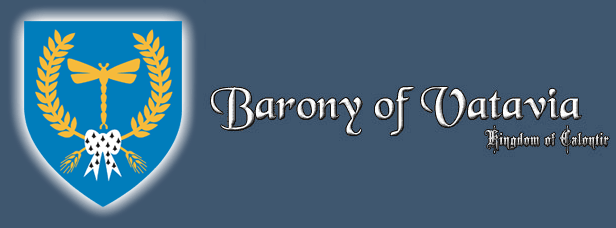
Crusades and History
by Friar Thomas Bacon (David Moreno)
Orignally published in the August 1997, A.S. XXXII issue of the Dragonflyre, a publication of the Barony of Vatavia.
When most people think of the Crusades, what usually comes to mind are the military campaigns, sieges and battles that pockmark this section of history. They think of the religious fever that inspired and sustained this effort. And they of it as a doomed enterprise that achieved little but add to the general ill will to this fractious planet. Yet, while the Crusaders achieved their intended goals but for a short time, it was the secondary effects that changed all of history. It is these effects that will be explored in this essay.
Now I will confine my scope to the Crusades to the Middle East, which are the ones most people think of when the topic comes up. Other Crusades of the time period include those of the Baltic region, the Spanish peninsula, and Southern France. Perhaps in another essay I will talk of them.
The single biggest effect the Crusades had is that it connected Europe with the rest of the world. Until the First Crusade, Europe was an insular culture, concerned mostly with survival. While goods from elsewhere would seep in, they were rare and very expensive. That all changed with the blossoming of the crusading movement.
Not only did Europe look out on the rest of the world with confidence, but also with each wave of Crusaders, large numbers of people would be exposed to goods and ideas they would not otherwise realized existed. Since the Crusading States were embedded in a population that was passively, if not actively hostile, they had to be continually reinforced from abroad. From this logistical train came the first commercial empires. And because of these empires, goods and ideas flowed into Europe as never before.
And to pay for these goods: spices, cotton, silks, and exotic fruits, came metals from Germany and textiles from Flanders, made from wool from England. From this trade, and the industries that it inspired arose the middle class that would overthrow the old feudal order.
Ideas also flowed over the trade routes. Much has been made of the introduction of classical Greek texts during this time. Actually many of these texts were already available in Europe, but had been so encrusted by previous commentaries as to obscure their meaning. What came from the Muslims were cleaner copies and sharply differing commentary, which sparked new discussions of these olds ideas.
Among the new ideas that did flood in were new concepts of fortification and siege weaponry, mathematics, and chemistry. What was exceptional in this was the ease and quickness these new ideas were incorporated. Not only in the narrow fields from which they originated, but though all fields of western thought, if only metaphorically. This represents one of the most unique aspects of western civilization. In all other cultures, books written centuries ago can still be considered relevant today. In western society, if it is ten years old, it is obsolete.
One of the great historical questions is why of all the great world cultures, it is the Europeans that came to dominate the world. The Chinese are far older; the Muslims were far more widespread. The answers have ranges from the individualism of Christianity to the wiliness to adapt to changes. I believe it was an addiction to spices.
The fall of Constantinople in 1452 cut off the flow of spices from the Far East. Actually they still could be had, the price just went through the roof. Of the cultures of the world at the time, only Europe had an unsuitable demand for stuff that could not be acquired within its borders. And that supple line had just been cut and could not be easily reinstated.
This set off a major scramble to find other means to satisfy the demand. Thus started the Age of Exploration. And with this New World web of commerce came world domination.
The rise of trade, towns, and the middle class did not occur because of the Crusades. Much of European history of the Middle Ages would roughly remain the same if they had not occurred. But had they not occurred much of the great Mediterranean trade would not have arisen, and so the fall of Constantinople would not nearly have the effect it did. There would be no great impetus to scour the oceans for another route to the Far East, and so there would be no Age of Exploration and all that followed from it.
While the Crusader dream of a Christian Jerusalem lasted less then a century, and it would be over seven hundred years before another Christian would stride down her streets as ruler, the Crusaders did setup the conditions that would lead to a greater destiny.
Copyright © 1997 - present His Lordship Friar Thomas Bacon (David Moreno). All rights reserved.